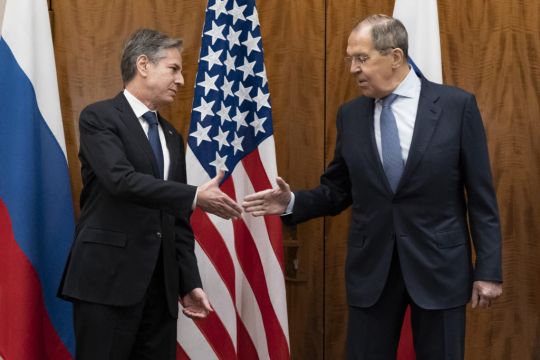The United States and Russia are trying to avert another devastating conflict in Europe, but the two powers’ top diplomats warned no breakthrough was imminent as fears rise that Moscow is planning to invade Ukraine.
Armed with seemingly intractable and diametrically opposed demands, US secretary of state Antony Blinken and Russian foreign minister Sergey Lavrov met in Geneva, Switzerland, at what the American said was a “critical moment”.
The talks were shaping up as a possible last-ditch effort at dialogue.
With an estimated 100,000 Russian troops massed near Ukraine, many fear Moscow is preparing an invasion although Russia denies that.
The US and its allies are scrambling to present a united front to prevent that or co-ordinate a tough response if they cannot.
After the talks, Mr Lavrov called them “constructive and useful” and said that the US agreed to provide written responses to Russian demands on Ukraine and Nato next week.
That could at least delay any imminent aggression for a few days. But he declined to characterise that step.
“I can’t say whether we are on the right path or not,” he told reporters. “We will see when we get the American responses.”
Ahead of the meeting, the two diplomats remained far apart.
“We don’t expect to resolve our differences here today. But I do hope and expect that we can test whether the path of diplomacy or dialogue remains open,” Mr Blinken told Mr Lavrov. “This is a critical moment.”
Mr Lavrov, meanwhile, said he did not “expect a breakthrough at these negotiations either”.
He added: “What we expect is concrete answers to our concrete proposals.”
Moscow has demanded concessions from Nato over the western alliance’s relationship with Ukraine, a former Soviet republic.
Washington and its allies have repeatedly promised “severe” consequences such as tough economic sanctions – though not military action – against Russia if an invasion goes ahead.

Mr Blinken repeated that warning on Friday. He said the US and its allies were committed to diplomacy, but were also committed, “if that proves impossible, and Russia decides to pursue aggression against Ukraine, to a united, swift and severe response”.
But he said he also wanted to use the opportunity to share directly with Mr Lavrov some “concrete ideas to address some of the concerns that you have raised, as well as the deep concerns that many of us have about Russia’s actions”.
After meeting with Ukraine’s president in Kyiv and top diplomats from Britain, France and Germany in Berlin this week, Mr Blinken faces Mr Lavrov in a meeting that is shaping up as a possible last-ditch effort at dialogue and a negotiated agreement – but both sides sticking to so-far irreconcilable red lines.
On Thursday in Berlin, Mr Blinken warned of a “swift, severe” response from the US and its allies if an invasion is launched, and the US treasury department slapped new sanctions on four Ukrainian officials.
Mr Blinken said the four were at the centre of a Kremlin effort which began in 2020 to damage Ukraine’s ability to “independently function”.

Mr Blinken took pains to stress US unity with its allies in opposition to a possible Russian invasion – and tried to do just that on Thursday, a day after US President Joe Biden drew widespread criticism for saying retaliation for Russian aggression in Ukraine would depend on the details and that a “minor incursion” could prompt discord among Western allies.
On Thursday, Mr Biden cautioned that any Russian troop movements across Ukraine’s border would constitute an invasion and that Moscow would “pay a heavy price” for such an action.
“I’ve been absolutely clear with President Putin,” Mr Biden said. “He has no misunderstanding: Any, any assembled Russian units move across the Ukrainian border, that is an invasion.”
Russia has denied it is planning an invasion and instead accused the West on Thursday of plotting “provocations” in Ukraine, citing the delivery of weapons to the country by British military transport planes in recent days.
Russia wants binding security guarantees, including a permanent prohibition on Ukrainian membership in Nato, to which Kyiv aspires, and the removal of most of the US and allied military presence in eastern Europe.
The US and its European partners say they are willing to consider certain less-dramatic gestures but that the Russian demands are out of the question and that Vladimir Putin knows they are non-starters.







